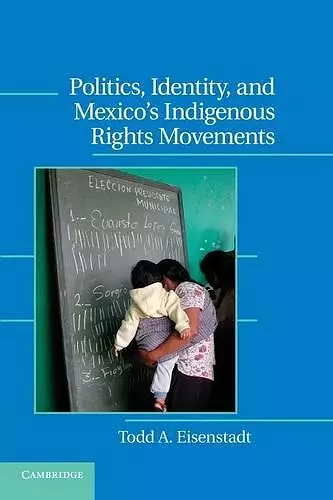Politics, Identity, and Mexico’s Indigenous Rights Movements
Format:Paperback
Publisher:Cambridge University Press
Published:22nd Aug '13
Currently unavailable, and unfortunately no date known when it will be back

Argues that indigenous and non-indigenous individuals in southern Mexico have been united by socioeconomic and land tenure institution variables as well as by ethnic identity.
Drawing on original survey data, this book argues that, contrary to claims by the 1994 Zapatista insurgency, indigenous and non-indigenous respondents in southern Mexico are united by socioeconomic conditions and land tenure institutions as well as by ethnic identity.Drawing on an original survey of more than 5,000 respondents, this book argues that, contrary to claims by the 1994 Zapatista insurgency, indigenous and non-indigenous respondents in southern Mexico have been united by socioeconomic conditions and land tenure institutions as well as by ethnic identity. It concludes that - contrary to many analyses of Chiapas's 1994 indigenous rebellion - external influences can trump ideology in framing social movements. Rural Chiapas's prevalent communitarian attitudes resulted partly from external land tenure institutions, rather than from indigenous identities alone. The book further points to recent indigenous rights movements in neighboring Oaxaca, Mexico, as examples of bottom-up multicultural institutions that might be emulated in Mexico and elsewhere in Latin America.
'In this fascinating and provocative book based on a survey of some 5,000 indigenous participants, Eisenstadt finds that - contrary to the claims of social movement activists and many social scientists - indigenous citizens in Oaxaca and Chiapas exhibit a complex mix of communitarian and pluralist attitudes. Its use of both quantitative and qualitative methods makes it a 'must-read' for students of Indian politics and social movements in Mexico and across the Americas.' Shannan L. Mattiace, Allegheny College
'Through surveys and comparative case studies, Eisenstadt sheds new light on the complex, micro-level processes by which individuals and indigenous communities construct political identities. He demonstrates that individualist as well as communitarian approaches to citizenship rights are found among indigenous groups in southern Mexico, and he helps to explain how different patterns of political and economic development shape alternative identities based on class and ethnicity. This book is a major contribution to the study of indigenous politics and social movements in contemporary Latin America.' Kenneth M. Roberts, Cornell University
'Based on a pioneer survey and on insightful fieldwork, Eisenstadt's fascinating book brings to life the complex and strategic nature of indigenous identities in Mexico. His finding that communitarian attitudes depend on the nature of agrarian institutions and on histories of rural protest, rather than on ethnicity, forces us to rethink our most fundamental assumptions about indigenity in Latin America.' Guillermo Trejo, Duke University
'… it presents not only a detailed comparative analysis of the origins and developments of these two movements, but also a comparison between the political, social and economic conditions that influenced the way in which claims for indigenous rights were presented by each movement.' Latin American Studies
ISBN: 9781107696761
Dimensions: 229mm x 152mm x 13mm
Weight: 340g
226 pages